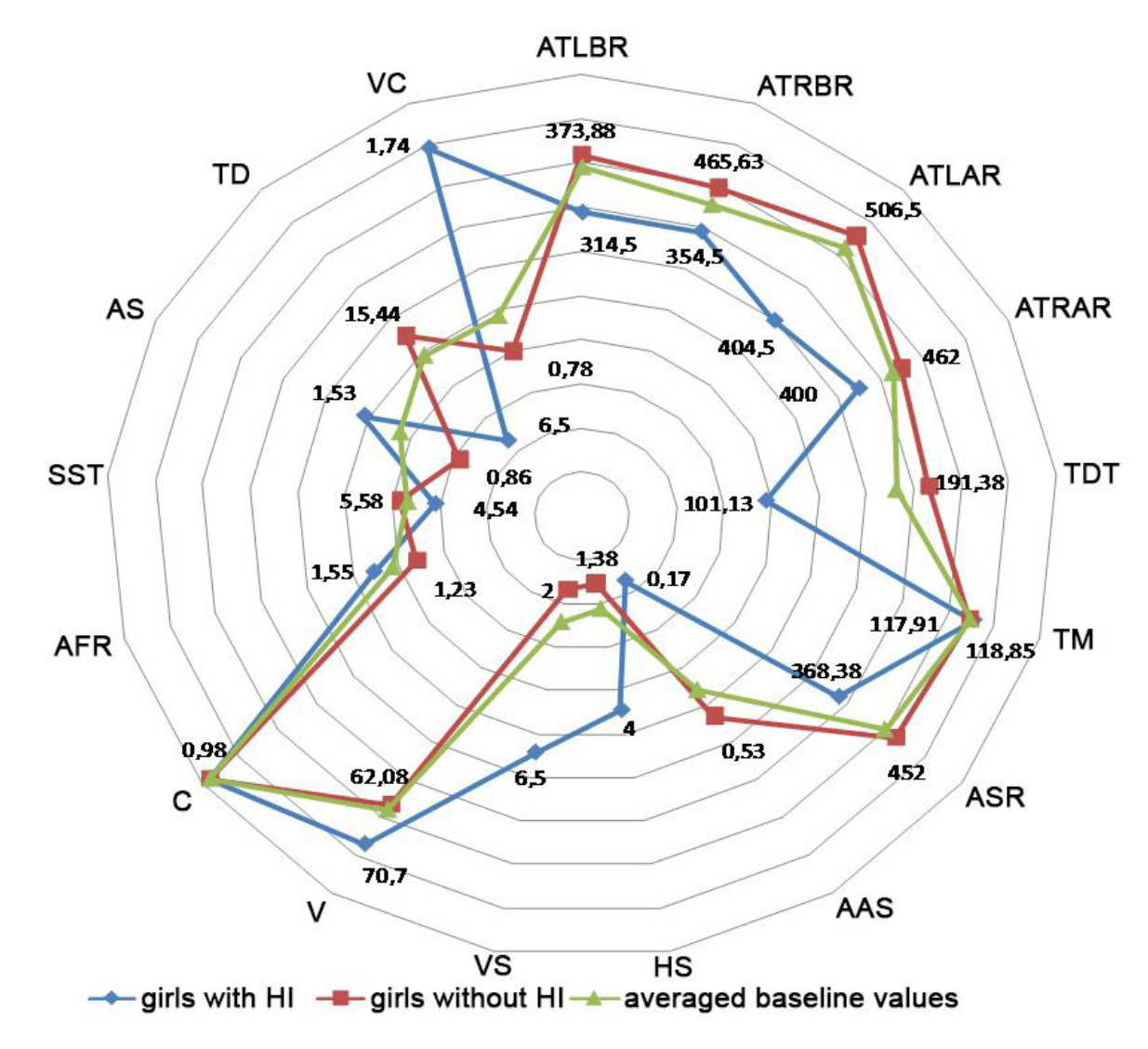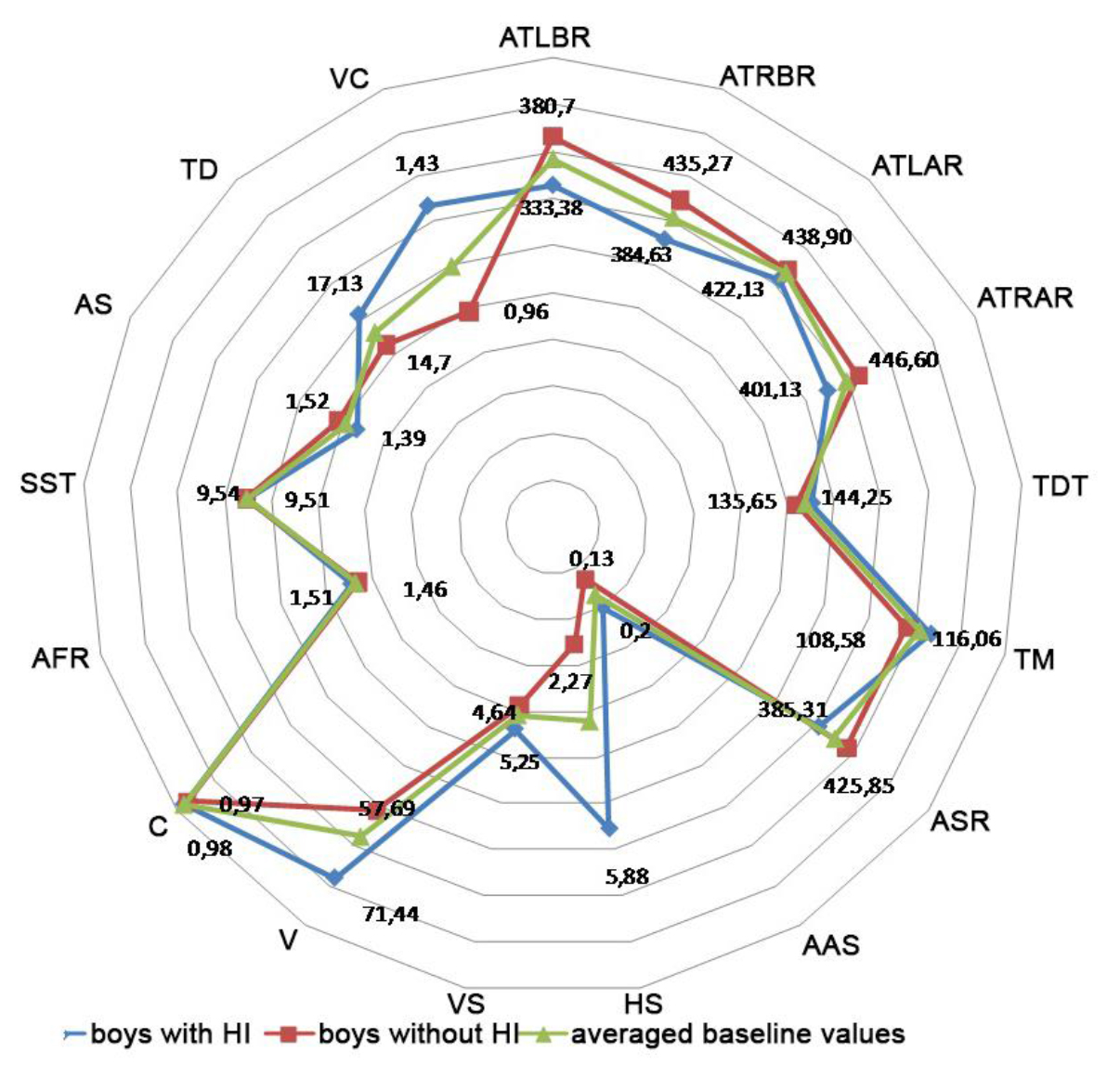Comparative effects of mental load impacts on student-athletes with health impairment versus their healthy peers in academic process
Фотографии:
ˑ:
Professor, Dr.Sc.Psych. B.P. Yakovlev
Associate Professor, PhD V.V. Apokin
Postgraduate N.R. Usaeva
Surgut State University, Surgut
Keywords: student-athletes with health impairments, academic process, mental stress, self-control, psychomotor functions.
Introduction. In a higher vocational education institution, the solidarity between students with health impairments and their healthy peers rests upon equal social participation conditions and opportunities for all members of the community.
Education and training of student-athletes with health impairments within a higher vocational education institution is a rather specific process. Structurally, it is characterized by variability, flexibility in the organization and planning of sports training periods and cycles, dosing of physical loads and distribution of educational loads in the academic process and during sport activities, training sessions. This specificity is due to the university environment and regular and pre-competitive training conditions. The university learning process is greatly influenced by mental stress, which is in turn caused by physical, psychological and social adaptation to the conditions for self-organization of the academic process, human relationships between students and other factors and conditions.
We understand mental stress as an undirected process of interaction between external (environmental, behavioural, situational) conditions, i.e. objective load requirements, and internal (functions, states, features) ones, i.e. subjective manifestations that mobilize and motivate a person to a particular goal-oriented activity [4, 8].
The in-depth study of this interaction between the internal and external conditions of mental load of students with health impairments is of considerable practical importance both within the framework of a proper psychological-pedagogical research on the mental load impacts on self-control over the motor, cognitive functions, and behaviour in general within a training session, academic day, week, semester, year, and with a view to develop science-based recommendations on the education and athletic training process optimizing and harmonizing. Therefore, knowledge of the psychological manifestations of students with health impairments under mental stress is an essential factor of formation of a proactive, harmoniously developed personality.
Owing to the fact that our research involved both highly-skilled student-athletes with health impairments and healthy student-athletes, we paid special attention to the functional indices of the efficiency and quality of self-control over mental activities in terms of the ever-changing emotional states [7]. The ability to control the parameters of own actions, with due regard to the mental load impacts when taking tests and examinations, is an important indicator of the self-management skill applied not only in extreme situations in sports practice but also in stressful training situations [1, 2, 5, 8, 9 ].
As long as an athlete possesses the sufficient skill to optimally adjust the parameters of his/her actions for the intensity of the efforts applied, tempo, rhythm, rate, amplitude, etc., he/she is able to efficiently implement the structure of non-specific and specific motor actions [1-3, 5, 9]. The effectiveness of control over own motor actions largely depends on the level of development and formation of athletes’ psychomotor skills, which makes us employ psychomotor methods in the system of psychological control as the indicators of the self-control skill in terms of emotional tension in the academic process [6].
Comparing and analyzing individual differences in sensorimotor activity, we can make an analogy between the laboratory and externally observable features of athlete’s motor actions, his/her temporal readiness to respond, accuracy in spatial reflection of speed, direction, acceleration of movement of the observed object.
Hence, it is important for us to objectively estimate and analyze the psychomotor functions in student-athletes with health impairments, as under specific conditions of emotional tension these functions become highly flexible and variable. The psychomotor measures of speed and accuracy are the informative indicators of the psychomotor functions in highly-skilled athletes with different levels of health.
The purpose of the research was to conduct a comparative analysis of the mental load impacts on the quality and efficiency of the psychomotor functions in student-athletes with and without health impairments.
Methods and structure of the study. The studies were conducted based on the psychological control during the examination period with two groups of student-athletes with health impairments (sports qualifications of HMS - 5, MSIC - 1 and MS - 4 with hearing impairment) and healthy student-athletes involved. The athletes (girls and boys) were examined three days before the tests and examinations.
We implemented an integrated methodology including quantitative and qualitative measurements. Using the hardware and software complex "Activatiometer AC-9K", we diagnosed a simple motor reaction (ATLBR - average time on left before re-doing and ATRBR - average time on right before re-doing), immediate choice reaction re-doing (ATLAR - average time on left after re-doing, ATRAR - average time on right after re-doing, TDT - total derivative time, TM - total mobility, ASR - attention switch rate, AAS – accuracy in attention switch), tremor (HS – number of touches when passing horizontal slots, VS - number of touches when passing vertical slots). The Toulouse-Pieron test was used to measure test execution speed (V), test execution quality coefficient (C - attention concentration index), average failure rate (AFR), speed stability with time (SST), attention span (AS). Based on the Luscher test, we calculated the total deviation from the autogenic norm (TD) and vegetative coefficient (VC).
Results and discussion. Figures 1 and 2 illustrate the average indices of the psychomotor functions for the two subgroups of subjects under specific educational and mental loads. The analysis of the results of examination of student-athletes of the two groups revealed that, in most cases, the dynamics of changes in the psychomotor indices under specific conditions of the academic process is more pronounced than against the background of the training process. The results of comparison of the mean values suggest that, in terms of emotional tension, the quality and efficiency of self-control of the psychomotor functions differ in direction and degree of self-control.

Fig. 1. Mean-group values of psychomotor functions in girls

Fig. 2. Mean-group values of psychomotor functions in boys
While evaluating the psychomotor functions in student-athletes with health impairments, it was the changes in the function intensity and direction of self-control that served as the informative indicators: speed of response (latent period of simple and complex visual-motor reaction, maximum rate of low amplitude movement, operational count rate in the correctional task); accuracy (horizontal and vertical tremor, subjective assessment of microintervals of time); stability (statistical coefficient of variability of simple and complex visual-motor reaction and response to a moving object); activation (ratio between the optimal rate of movement and its maximum rate).
It was found that boys and girls with health impairments had higher values of the simple motor reaction compared to student-athletes without health impairments (p<0.05). We registered lower values of TDT and AAS in girls with health impairments (p<0.01). The "tremor" test revealed significantly higher values in the number of touches to the horizontal and vertical slots both by boys and girls with health impairments (p<0.05). Boys and girls with health impairments demonstrated higher test execution speed when performing the Toulouse-Pieron test as compared to healthy student-athletes (p<0.05). According to the Luscher’s test, there were greater deviations from the autogenic norm and higher values of the vegetative coefficient in boys and girls with health impairments (p<0.05).
Conclusions. The analysis of the results of manifestation of emotional tension within the structure of psychomotor processes reveals that during the examination period there emerge well-marked differences in the mean group and individual values.
Selective mental load impacts in the majority of the tested highly-skilled athletes of the two groups are observed in the improvement of the response rate and tempo of movements at the expense of deterioration of the psychomotor function quality.
The intensity and multidirectional effect of emotional tension in terms of the academic and sporting activities invite further studies of the psychomotor functions in different conditions of mental load impacts on athletes with health impairments by applying the psychological control and assessment based on the integrated approach.
References
- Balandin V.I. Prognozirovanie v sporte (Forecasting in sport) / V.I. Balandin, Y.M. Bludov, V.A. Plakhtienko. – Moscow: Fizkul'tura i sport, 1986. – 192 p.
- Kiselev Y.Y. Psikhodiagnostika, orientirovannaya na otbor sportsmenov dlya podgotovki i uchastiya v sorevnovaniyakh (Psychodiagnostics focused on selection of athletes for training and competitive performance) / Y.Y. Kiselev // Psychology and modern sport. – Moscow: Fizkul'tura i sport, 1982. – P. 79-88.
- Kossov B.B. Printsipy izucheniya psikhicheskikh sostoyaniy i problema samoregulyatsii deyatelnosti sportsmena (Principles of study of mental states and problem of athlete's activity self-regulation) / B.B. Kossov // Psychology and modern sport. – Moscow: Fizkultura i sport, 1982. – P. 51-58.
- Psikhicheskaya nagruzka v sporte vysshikh dostizheniy (Mental load in elite sports sphere): monograph. – Surgut: RIO SurGPU (SSUPC), 2007. – 220 p.
- Psikhologiya fizicheskoy kul'tury: uchebnik (Psychology of Physical Culture: Tutorial) / B.P. Yakovlev, G.D. Babushkin. – Moscow: Sport, 2016. – 624 p.
- Psikhologo-pedagogicheskie metodiki v strukture podgotovki sportsmenov (Psychological and pedagogical techniques in athletic training structure): study guide / G.D. Babushkin. – Omsk: SibGUFK (SSUPC), 2015. – 228 p.
- Usaeva N.R. Sravnitel'ny analiz lichnostnykh osobennostey studentov-sportsmenov s ogranichennymi vozmozhnostyami zdorov'ya i zdorovykh studentov v usloviyakh uchebnoy deyatel'nosti (Comparative analysis of personality characteristics of student-athletes with impairments and healthy students during learning) / N.R. Usaeva, B.P. Yakovlev, V.V. Apokin // Teoriya i praktika fiz. kultury. – 2016. – # 7. – P. 89-93.
- Yakovlev B.P. Psikhicheskaya nagruzka v sporte vysshikh dostizheniy (Mental load in elite sports) / B.P. Yakovlev. – Surgut: RIO SurGPU (SSPU), 2007. – 201 p.
- Yakovlev B.P. Emotsional'naya napryazhennost' v sportivnoy deyatel'nosti: monografiya (Emotional intensity in sports activity: monograph) / B.P. Yakovlev. – Surgut: RIO SurGPI (SSUPC), 2003. – 182 p.
Corresponding author: apokin_vv@mail.ru
Abstract
The theoretical provisions and practical recommendations presently available in the reference literature, including the practical recommendations on the disabled students’ education and athletic training process optimizing and harmonizing – are quite general in fact, and it makes them difficult for practical implementation. The existing theory of inclusive education reports no substantiating empirical studies to assess the effects of mental stresses on the mental activity self-control, psychomotor and psychophysiological functions in comparison with those of healthy athletes and with due accounts of the age and gender specifics in an academic education environment. All these facts are indicative of the issue still being in need of detailed research. Therefore, studies of the effects of educational, physical and mental stresses in the academic professional educational system with an emphasis on the highly-skilled university athletes with health impairments training process optimizing and harmonizing in terms of the academic curricula structure and quality – are highly topical at present.




